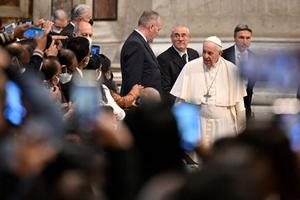Sri Lankan Priest Involved in Protests Granted Bail
Claims were made during the hearing that Father Peiris was guilty of criminal offenses, including being part of an unlawful assembly, obstructing public employees from performing duties, and criminal assault.

A priest involved in the recent protests in Sri Lanka has been granted bail after being accused of several criminal offenses.
Father Amila Jeewantha Peiris appeared in the Colombo Fort Magistrate's Court on Aug. 12 and was granted bail thanks to two personal sureties of 500,000 Sri Lankan rupees (around $1,375).
The 45-year-old priest, serving in Ratnapura diocese, was driven by the country‘s economic crisis to join protesters in Colombo, Sri Lanka’s capital city.
Police searched for him at his parents‘ home and St Joseph’s Church in Balangoda — 89 miles from Colombo — on July 27, UCA News reported.
Father Peiris subsequently filed a Fundamental Rights petition with the Supreme Court to prevent his arrest. A hearing was held on Aug. 9.
Claims were made during the hearing that Father Peiris was guilty of criminal offenses, including being part of an unlawful assembly, obstructing public employees from performing duties, and criminal assault.
While government lawyers claimed that he was in defiance of a court order, Father Peiris argued that he had not received any such court order.
Protests against the Sri Lankan government began in March 2022. Citizens of Sri Lanka have been protesting the economic crisis in the country, which they say is caused by government mismanagement of funds.
In April, the bishops of Sri Lanka urged the government to act to protect the country from becoming a “failed state.”
“All successive governments to date are responsible in varying degrees for the present state of affairs,” the bishops said.
Mahinda Rajapaksa, the Prime Minister of Sri Lanka, resigned on May 9 in response to the protests. On May 12, President Gotabaya Rajapaksa appointed Ranil Wickremesinghe as Prime Minister.
On July 9, tens of thousands of protesters stormed the presidential palace buildings in Colombo, demanding that Gotabaya Rajapaksa step down as President. Rajapaksa later fled, and Wickremesinghe was appointed as acting president.
Although protesters subsequently agreed to stop the occupation of official buildings, protests and outbreaks of violence continue as the economic crisis persists.
Amnesty International has commented on the continuing tension in Sri Lanka, saying: “The protesters have a right to demonstrate peacefully.”
“Excessive use of force, intimidation and unlawful arrests seem to be an endlessly repetitive pattern in which the Sri Lankan authorities respond to dissent and peaceful assembly.”
Speaking to the BBC, Father Peiris echoed these sentiments.
“My only worry is that, with these innocent protests, many youths are brutally arrested and being replaced. For that, I really worry, as I‘m worried about the lives of our youth and our people, and they are crying for justice, so for that, I’m worried.”
- Keywords:
- sri lanka














